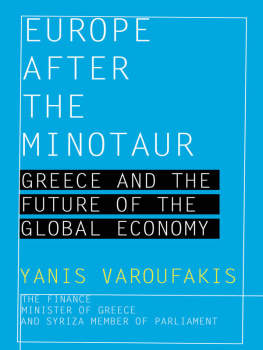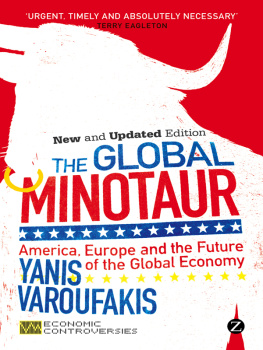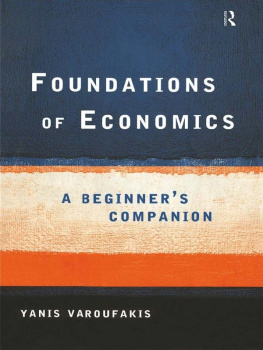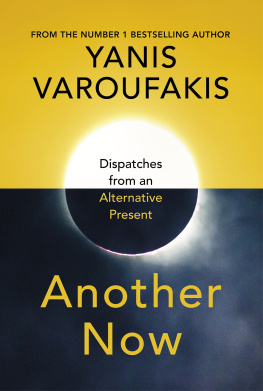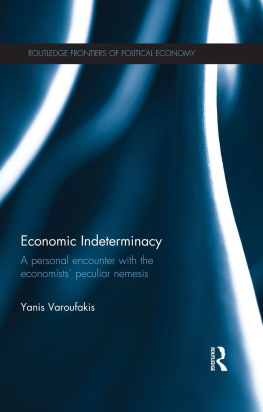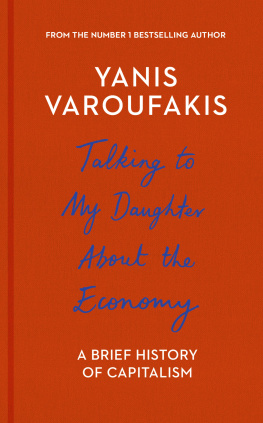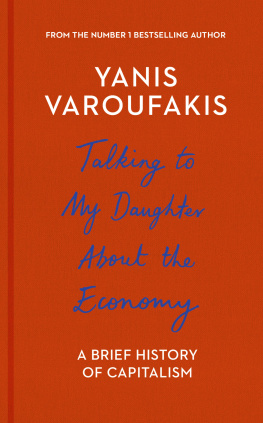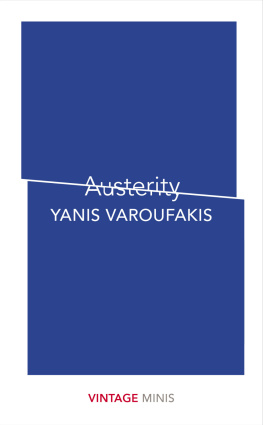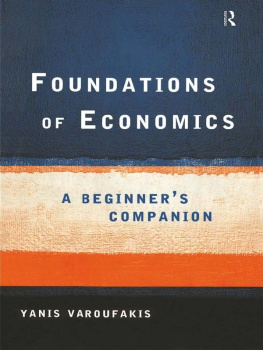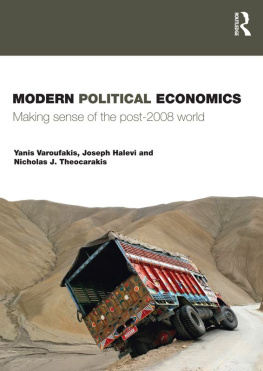Yanis Varoufakis - Europe After the Minotaur: Greece and the Future of the Global Economy
Here you can read online Yanis Varoufakis - Europe After the Minotaur: Greece and the Future of the Global Economy full text of the book (entire story) in english for free. Download pdf and epub, get meaning, cover and reviews about this ebook. year: 2015, publisher: Zed Books, genre: Romance novel. Description of the work, (preface) as well as reviews are available. Best literature library LitArk.com created for fans of good reading and offers a wide selection of genres:
Romance novel
Science fiction
Adventure
Detective
Science
History
Home and family
Prose
Art
Politics
Computer
Non-fiction
Religion
Business
Children
Humor
Choose a favorite category and find really read worthwhile books. Enjoy immersion in the world of imagination, feel the emotions of the characters or learn something new for yourself, make an fascinating discovery.
- Book:Europe After the Minotaur: Greece and the Future of the Global Economy
- Author:
- Publisher:Zed Books
- Genre:
- Year:2015
- Rating:4 / 5
- Favourites:Add to favourites
- Your mark:
- 80
- 1
- 2
- 3
- 4
- 5
Europe After the Minotaur: Greece and the Future of the Global Economy: summary, description and annotation
We offer to read an annotation, description, summary or preface (depends on what the author of the book "Europe After the Minotaur: Greece and the Future of the Global Economy" wrote himself). If you haven't found the necessary information about the book — write in the comments, we will try to find it.
Europe After the Minotaur: Greece and the Future of the Global Economy — read online for free the complete book (whole text) full work
Below is the text of the book, divided by pages. System saving the place of the last page read, allows you to conveniently read the book "Europe After the Minotaur: Greece and the Future of the Global Economy" online for free, without having to search again every time where you left off. Put a bookmark, and you can go to the page where you finished reading at any time.
Font size:
Interval:
Bookmark:
Europe after the Minotaur
Greece and the Future of the Global Economy
excerpts from The Global Minotaur: America, Europe and the Future of the Global Economy
YANIS VAROUFAKIS

Zed Books
LONDON
ABOUT THIS BOOK
Syrizas victory in the Greek general election in January 2015 is a truly historic and profound event the first government of the radical left in Europe since World War Two. In this short ebook, extracted from the updated edition of , Yanis Varoufakis, the new finance minister of Greece and a Syriza MP, outlines his economic and political thinking and how he believes Europe can move beyond cuts and austerity.
Varoufakis shows how todays crisis in Europe is one inevitable symptom of a global system which is now as unsustainable as it is imbalanced. With powerful clarity and conviction, he lays out the options available to us for reintroducing reason into a highly irrational global economic order.
This is a unique insight into the thinking of a key figure in the Syriza government, who is set to become a hugely influential figure in European politics.
ABOUT THE AUTHOR
Yanis Varoufakis is the Greek minister of finance and an MP for Syriza. Previously, he was professor of economics at the University of Athens and visiting professor at the University of Texas. Born in Athens, 1961, Varoufakis completed his secondary education in Greece before moving to England where he read mathematics and economics at the universities of Essex and Birmingham. He has taught at various British universities (Essex, East Anglia, Cambridge, Glasgow), and spent twelve years teaching at the University of Sydney.
Europe after the Minotaur: Greece and the Future of the Global Economy is an edited excerpt from The Global Minotaur: America, Europe and the Future of the Global Economy, which was first published in 2011 and updated in 2013.
Published by Zed Books Ltd, 7 Cynthia Street, London N1 9JF, UK
www.zedbooks.co.uk
Copyright Yanis Varoufakis 2011, 2013, 2015
The right of Yanis Varoufakis to be identified as the author of this work has been asserted by him in accordance with the Copyright, Designs and Patents Act, 1988
Typeset in Monotype Bulmer
Cover design: www.alice-marwick.co.uk
All rights reserved. No part of this publication may be reproduced, stored in a retrieval system or transmitted in any form or by any means, electronic, mechanical, photocopying or otherwise, without the prior permission of Zed Books Ltd.
A catalogue record for this book is available from the British Library
ISBN 978 1 78360 609 2 MOBI
Contents
For Danae Stratou, my global partner
Preface to the new edition
This book originally aimed at pressing a useful metaphor into the service of elucidating a troubled world; a world that could no longer be understood properly by means of the paradigms that dominated our thinking before the Crash of 2008. Its purpose was to appeal to the non-specialist reader on whose behalf my metaphor was to unveil a simple, yet never simplistic, account of a very complex global tragedy. The idea was not to discount all other explanations but, rather, to provide a platform for combining many different explanations, each valid in its own way, into an overarching analysis of the global arrangement that crashed and burned in 2008, leaving our world in a state of stunned disenchantment.
The Global Minotaur metaphor crept up on me in 2002, after endless conversations with friend, colleague and co-author Joseph Halevi. Our discussions on what made the world tick after the 1970s economic crises produced a coherent, albeit complex, view of the global economic system in which Americas deficits, Wall Street and the ever-declining real value of American wages, played a defining and, paradoxically, a hegemonic role.
The gist of our argument was that the defining characteristic of the post-1971 era was a reversal of the flow of trade and capital surpluses between the United States and the rest of the world. The hegemon, for the first time in world history, strengthened its hegemony by wilfully enlarging its deficits. The trick was to understand how America accomplished this and the tragic manner in which its success gave rise to the financialization which both reinforced US dominance and, simultaneously, implanted the seeds of its potential downfall. Part of the trick was the deployment of the Global Minotaur narrative, which was born as an attempt to simplify the arguments complexity. (See our joint article The Global Minotaur, Monthly Review 55, JulyAugust 2003, pp. 5674.)
When five years later, in 2008, the financial system imploded, Danae Stratou, my partner in everything, incited me to write this book on the strength of the main metaphors capacity to relate my complex story to a lay readership. It was her belief in my ability to do this that gave me the idea and impetus to try it. I began writing the book in our Athens home, at a time when the dark clouds around our country were still thin and most of our friends and family would not believe that Greece was about to fall into a never-ending tailspin. Against that background of resistance to bad omens, and while writing the books early draft, I was beginning to gain a degree of notoriety in the Greek and international media as a doomsayer who believed that not only was Greeces bankruptcy inevitable but that it was a precursor of the Eurozones unravelling as well. Only then did I notice the irony of using a Greek metaphor (that of the Minoan Minotaur) by which to account for an international catastrophe of which Greece would be the worst hit victim.
Nonetheless, immersed in my writing, I refused to give Greece too prominent a role therein. A dichotomy soon emerged in my daily routine: while spending hour upon hour in radio and television studios debating Greeces steady deterioration, I would return to my Minotaur script determined more than ever to keep Greece off its pages. For if my diagnosis about Greeces misfortune was right (i.e. that there is no such thing as a Greek crisis, but rather that Greece is a symptom of a broader shift in global economic history) it was imperative that my book should reflect this. Thus, the United States was, and remains in this updated edition, the focal point of the analysis.
At the level of intellectual and analytical development, it was my engagement with the larger canvas of the euro crisis that gave me an opportunity to test the Global Minotaurs capacity to throw helpful light on our post-2008 circumstances, and to elicit policy suggestions. Indeed, while working on this books first edition, I also expended a great deal of energy writing and rewriting, together with Stuart Holland, our A Modest Proposal for Resolving the Euro Crisis. The campaign that Stuart and I ran across the breadth of Europe to promote our Modest Proposal (taking it even to North America and Australia) was an eye-opener, a source of insight, a test-bed for the books sub-hypotheses.
As is always the case with powerful metaphors, the danger lurked that my analysis and predictions might have been covertly influenced by the allegorical power of the Global Minotaur. Especially while completing the book (some time in January 2011), at the point when I felt compelled to state my prognosis for the future of the world economy, the anxiety that my conclusions might have been hijacked by an irresistible urge to stay loyal to the chosen metaphor intensified. Had I allowed myself to be lulled into a false sense of analytical security in the comforting bosom of an allegory of my own creation? The fact that the Crisis was mutating and changing its colours at a frightening pace reinforced the angst and made me feel exceptionally exposed to the vagaries of our generations turbocharged history.
Next pageFont size:
Interval:
Bookmark:
Similar books «Europe After the Minotaur: Greece and the Future of the Global Economy»
Look at similar books to Europe After the Minotaur: Greece and the Future of the Global Economy. We have selected literature similar in name and meaning in the hope of providing readers with more options to find new, interesting, not yet read works.
Discussion, reviews of the book Europe After the Minotaur: Greece and the Future of the Global Economy and just readers' own opinions. Leave your comments, write what you think about the work, its meaning or the main characters. Specify what exactly you liked and what you didn't like, and why you think so.

